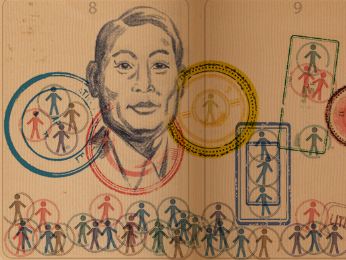Chiune Sugihara: Google Doodle honours Japanese diplomat who saved Jews from Holocaust
Vice-consul in Lithuania defied government to write thousands of life-saving visas for desperate refugees
Your support helps us to tell the story
From reproductive rights to climate change to Big Tech, The Independent is on the ground when the story is developing. Whether it's investigating the financials of Elon Musk's pro-Trump PAC or producing our latest documentary, 'The A Word', which shines a light on the American women fighting for reproductive rights, we know how important it is to parse out the facts from the messaging.
At such a critical moment in US history, we need reporters on the ground. Your donation allows us to keep sending journalists to speak to both sides of the story.
The Independent is trusted by Americans across the entire political spectrum. And unlike many other quality news outlets, we choose not to lock Americans out of our reporting and analysis with paywalls. We believe quality journalism should be available to everyone, paid for by those who can afford it.
Your support makes all the difference.A little-known Japanese diplomat who saved the lives of thousands of Jews during the Second World War has been honoured with a Google Doodle.
The mild-mannered and humble Chiune Sugihara became vice-consul at the Japanese consulate in Kaunas, Lithuania in 1939, just as the conflict was breaking out.
He had been sent to monitor Soviet and German troop movements but in 1940 as the country was occupied by the USSR much of its large Jewish population, and other Jewish refugees who had already fled the Nazi invasion of Poland, began to look for a way out.
Working with a Dutch diplomat, Mr Sugihara concocted an escape route: Jews would travel on the Trans-Siberian Railway through the Soviet Union, then into Japan, and finally on to find a safe haven in the Dutch colony of Curacao in the Caribbean.
He contacted his superiors in Tokyo three times asking permission to grant the necessary transit visas to allow the Jewish refugees to pass through Japan.
But each time his suggestion was rebuffed. “Absolutely not to be issued any traveller not holding firm end visa with guaranteed departure ex Japan,” the diplomatic cable to him read. “No exceptions.”
But from July, Mr Sugihara decided the threat to Jews remaining in Lithuania was too great and in defiance of his government began writing transit visas anyway.
“I told the Ministry of Foreign Affairs it was a matter of humanity,” he recalled years later. “I did not care if I lost my job.”
Painfully aware that his time in the country was short as the consulate was shutting down, the diplomat wrote at least 2,000 – some historians argue it was as many as 6,000 – visas by hand in just over six weeks, working from dawn to dusk until his hands ached.
His wife, who backed his risky decision, reportedly had to massage his calloused hands each night so he could briefly sleep before waking to start writing more visas.
In September, when he boarded a train with the other consular staff to return to Japan he reportedly was still writing visas, hurling them into the crowd of desperate Jews waiting on the platform.

In total, thousands of Polish and Lithuanian Jews managed to arrive safely in Japan thanks to Mr Sugihara’s illicit visas.
After Germany occupied Lithuania the following year the Nazis quickly murdered over 120,000 Jews – 95 per cent of the country's pre-war population.
After working elsewhere in occupied Europe during the rest of the war, Mr Sugihara was recalled home in 1946, but was asked to resign one year later.
Although officially this was due to the department downsizing, some sources, including his wife Yukiko Sugihara, claimed the diplomat was fired over the 1940 Lithuanian visas.
Mr Sugihara then disappeared into obscurity, working a series of menial jobs including selling lightbulbs door to door, for decades.
But in the 1960s one of the Jews saved by his visa who had by then made his home in Israel managed to track down his saviour and raised the profile of the astonishing tale.
By 1984 the humble vice-consul had become recognised by Israel’s Yad Vashem Holocaust museum as “Righteous Among the Nations”, a title exclusively given to non-Jews who saved Jews from the Nazi extermination programme.
Asked then why he had helped the thousands of refugees in 1940, Mr Sugihara said: “People in Tokyo were not united. I felt it silly to deal with them. So, I made up my mind not to wait for their reply.
“I knew that somebody would surely complain about me in the future. But, I myself thought this would be the right thing to do. There is nothing wrong in saving many people's lives.”

Join our commenting forum
Join thought-provoking conversations, follow other Independent readers and see their replies
Comments